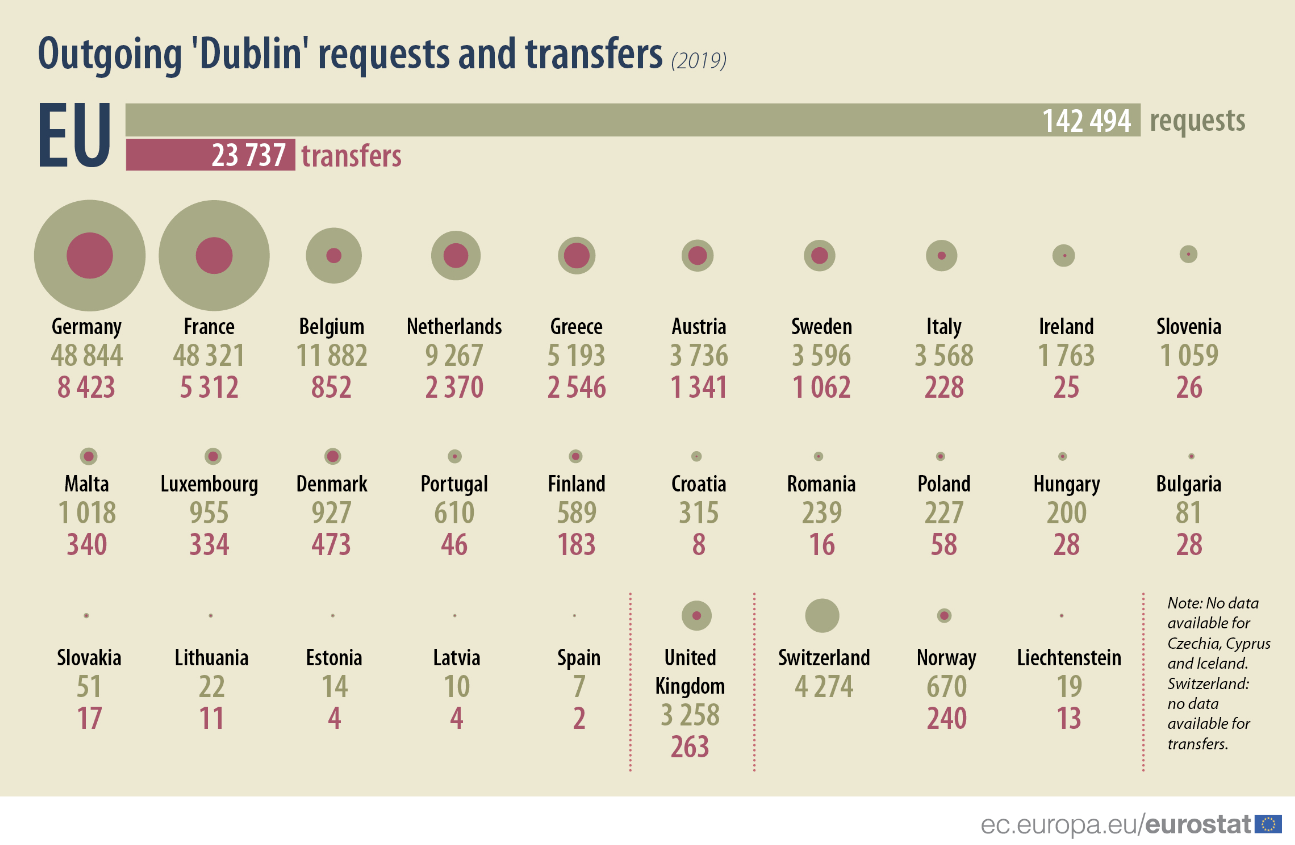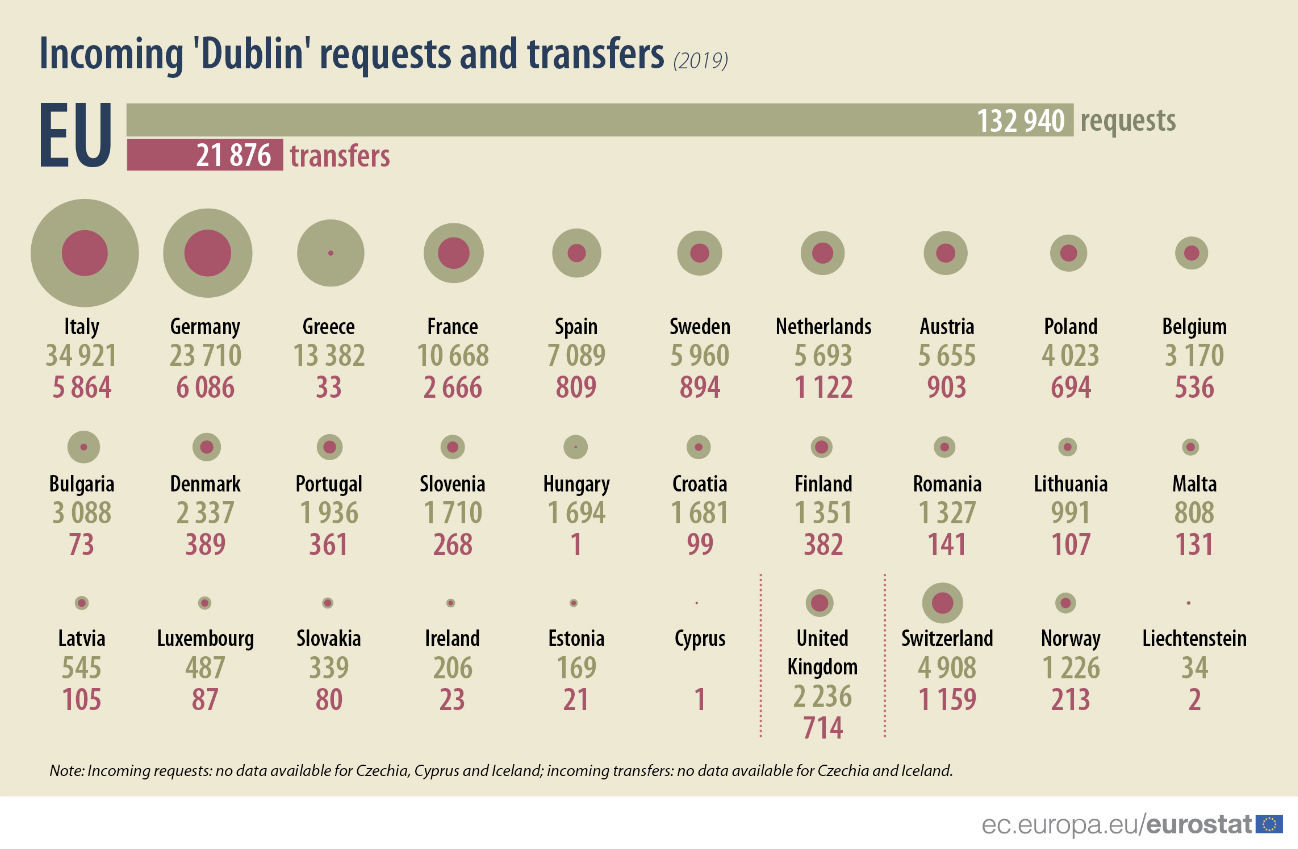Dublin statistics provide information on the functioning of the Dublin system, which establishes which Member State is responsible for the examination of an asylum application.
In 2019, the European Union (EU) Member States sent out 142 494 outgoing requests to transfer the responsibility to examine an asylum application and effectively implemented 23 737 outgoing transfers to other Member States.
Over the same period, 132 940 incoming requests were reported to be received by the EU Member States as well as 21 876 incoming transfers from other Member States.
Ongoing requests and transfers
The largest numbers of outgoing requests using the Dublin procedure were sent by Germany (48 844), France (48 321), each representing close to one-third of the total number of outgoing requests recorded in 2019. They were followed by Belgium (11 882) and the Netherlands (9 267). These four Member States together sent more than four-fifths (83%) of all outgoing requests in 2019.
The largest numbers of outgoing transfers were also reported by Germany (8 423) and France (5 312), followed by Greece (2 546), and the Netherlands (2 370). In these top four Member States, the transfer rates (calculated as actual outgoing transfers to outgoing requests) accounted for: 49.0% in Greece, 25.6% in the Netherlands, 17.2% in Germany and 11.0% in France.
Incoming requests and transfers
Italy received the largest number of incoming requests in 2019, a total of 34 921, followed by Germany with 23 710 incoming requests. Greece (13 382 requests) and France (10 668) were the only other EU Member States reporting more than 10 000 incoming requests. These four Member States together received more than three-fifths (62%) of all incoming requests in 2019.
By far the largest numbers of incoming transfers were reported by Germany (6 086) and Italy (5 864), while France and the Netherlands also recorded more than 1 000 incoming transfers in 2019. Among these four Member States, 25.7% of incoming procedures resulted in a transfer in Germany, 25.0% in France, 19.7% in the Netherlands and 16.8% in Italy.
The Dublin Regulation (EU) 604/2013 aims at reducing consecutive transfers of asylum seekers from one Member State to another and at preventing abuse of the system by the submission of several applications for asylum by one person. The main principle is that only one Member State is responsible for examining an asylum application by a citizen of a non-European Union country or by a stateless person.
If during the course of the processing of an application the authorities in a Member State decide that the application should be dealt with in another Member State, the authorities of the former may make a request to the latter to take over the responsibility of the asylum application (and consequently take over the applicant). Accordingly, the so called 'Dublin' statistics refer to outgoing requests (Member States report requests sent out) and incoming requests (Member States report requests received).
The number of outgoing requests is not equal to incoming requests at the EU level for several reasons, including: the data are shown for the EU Member States, but requests may also be sent to or received from EFTA countries; the data for the EU are incomplete, with different coverage almost every year and also differences in the coverage for incoming and outgoing requests even for the same year; possible administrative differences in the method and timing of recording of requests.
For more information:
- The source data can be found in Eurostat datasets: migr_dubri, migr_dubro, and migr_dubti, migr_dubto.
- Eurostat Statistics Explained article on Dublin Statistics.
Note: The European Union (EU) includes 27 EU Member States. The United Kingdom left the European Union on 31 January 2020. Further information is published here.
To contact us, please visit our User Support page.
For press queries, please contact our Media Support.



